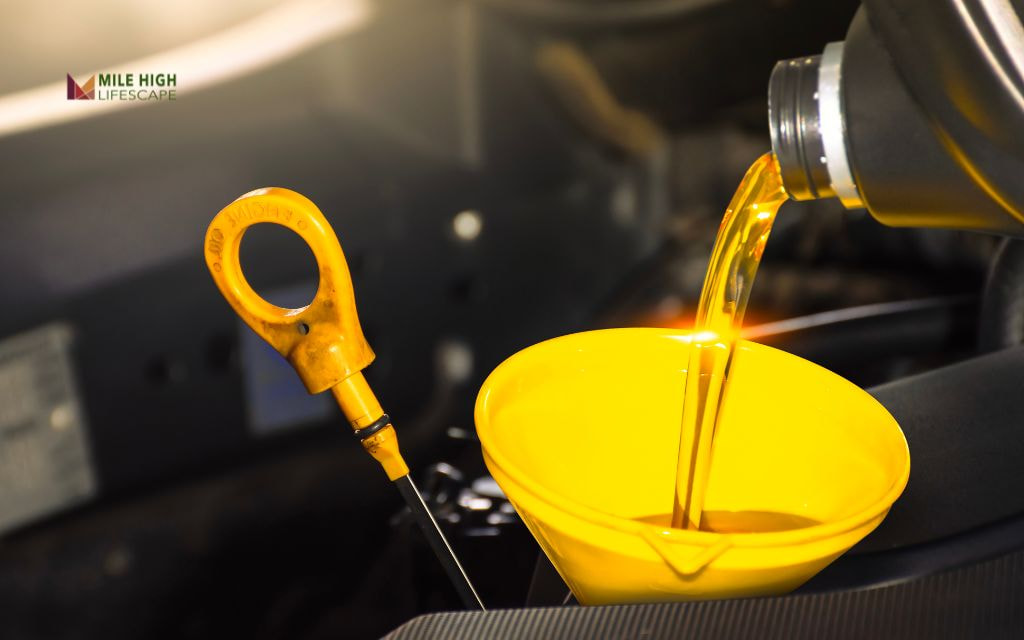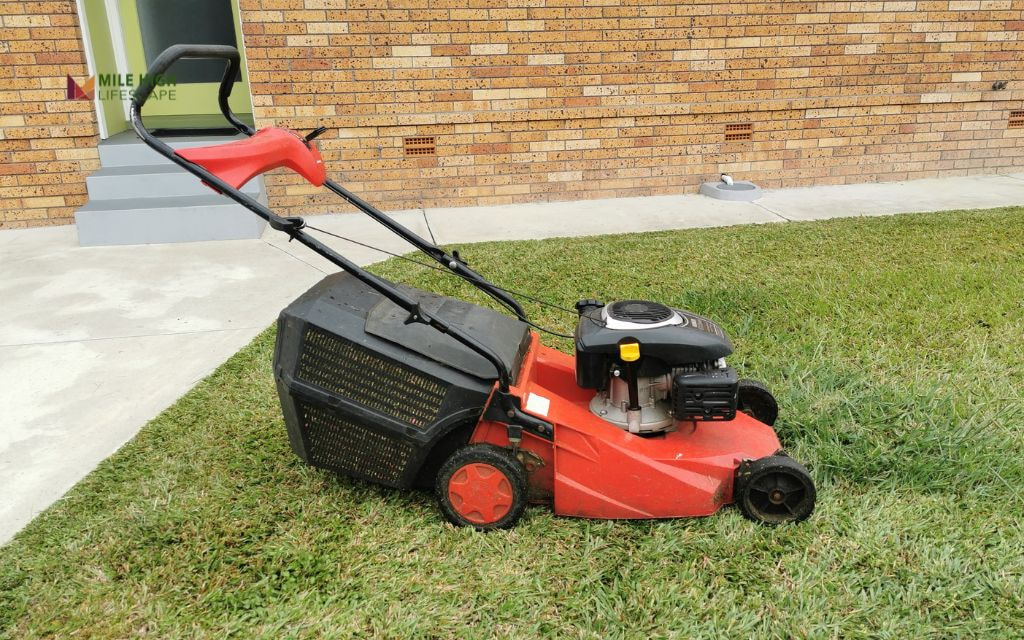“Can you use car engine oil in a lawn mower?” The short answer is no – you shouldn’t use car engine oil in your lawn mower, despite the tempting convenience.
While both engines need lubrication, your lawn mower faces vastly different challenges than your car. Lawn mowers run consistently hot, lack oil filtration systems, and operate at steady high RPMs – creating a harsh environment that requires specialized protection.
At Mile High Lifescape, we’ve witnessed the consequences when homeowners make this oil substitution. Seized engines, damaged valves, and excessive smoke often result from using the wrong oil type. The repair costs far exceed the small investment in proper lawn mower oil.
Continue reading to discover why this small maintenance decision makes a significant difference to your lawn care equipment.
Basics of Lawn Mower Engines
Two Main Engine Types
Lawn mowers operate with either two-stroke or four-stroke engines, each with different oil requirements.
- Two-stroke engines require oil mixed directly with fuel. These simpler engines complete their combustion cycle in just two piston movements. Without a separate oil reservoir, the oil-fuel mixture handles all lubrication as it moves through the engine.
- Four-stroke engines, found in most modern lawn mowers, use separate systems for fuel and oil. These engines function similarly to car engines but on a smaller scale. The oil circulates independently from the fuel, requiring regular oil changes to maintain protection.
How Lawn Mower Engines Work
Lawn mower engines operate in challenging conditions. They run at consistently high speeds (2,800-3,600 RPM) and temperatures, especially during summer mowing seasons in Denver.
Their compact design means the oil must work effectively in a high-heat environment with minimal cooling systems.
Unlike car engines that operate across varying speeds and temperatures, lawn mowers typically run at a constant high output during use. This steady high-temperature operation creates specific lubrication needs.
Difference Between Car And Lawn Mower Engine: The Missing Oil Filter
One critical difference between car and lawn mower engines: most lawn mowers operate without oil filters. This absence means the oil itself must maintain cleanliness throughout its service life.
In car engines, filters continuously remove contaminants from the oil. Without this filtration, lawn mower oil must resist breakdown and maintain its protective properties with no external cleaning mechanism.
This makes using the correct oil type even more important for lawn mowers than for vehicles.

Differences Between Car Engine Oil and Lawn Mower Oil
Viscosity and Temperature Considerations
Viscosity – oil’s resistance to flow – plays a crucial role in engine protection. Lawn mower manufacturers typically recommend SAE 30 oil for their engines, which provides optimal protection at the operating temperatures lawn mowers reach.
Car engine oils often use multi-viscosity formulations like 5W-30 or 10W-40. These oils change their flow characteristics based on temperature, offering protection across the wide temperature range vehicles experience. While this versatility benefits cars, lawn mowers operate in a narrower temperature range and require consistent viscosity.
The first number in multi-viscosity oils (the “W” number) indicates cold-start performance.
Lawn mowers typically don’t need the cold-weather starting capabilities required for cars in winter conditions, making specialized car oils unnecessarily complex for mower applications.
Additive Differences That Matter
Car engine oils contain additive packages designed for automotive conditions:
- Detergents that remove deposits
- Dispersants that hold contaminants in suspension
- Anti-wear compounds
- Friction modifiers
These additives complement automotive filtration systems and extended oil change intervals. Car engines might go 5,000-10,000 miles between oil changes, requiring additives that maintain performance over extended periods.
Lawn mower oils contain simpler additive packages focused on:
- High-temperature protection
- Anti-foam properties
- Corrosion inhibitors
The absence of filtration in lawn mowers means the oil doesn’t need to suspend contaminants for long periods, as regular oil changes remove these particles. Using car oil with excessive detergents in a lawn mower can attack gasket materials and lead to leaks.
Oil Change Frequency Expectations
- Car oils: Designed to last 3-6 months or thousands of miles between changes
- Lawn mower oils: Formulated for shorter service life—typically one season or 25-50 hours of operation
- Impact on formulation: Car oils contain unnecessary longevity additives that can affect lawn mower gaskets and seals
Can You Use Car Engine Oil in a Lawn Mower?
No, you should not use car engine oil in your lawn mower.
While it might work temporarily in an emergency, regular use of automotive oil will cause damage to your lawn mower engine over time.
The different operating conditions, engine design, and lack of filtration systems in lawn mowers require specific oil formulations that car oils don’t provide. Here are all the risks of using car engine oil in lawn mowers you must know.

Engine Wear and Damage
Using car engine oil in your lawn mower creates several potential problems:
Accelerated Component Wear
Car oils often have different viscosity ratings than what lawn mower engines require. This mismatch means critical engine components may not receive proper lubrication, especially during startup and high-temperature operation.
Bearings, crankshafts, and valve trains will experience metal-on-metal contact, leading to premature wear.
Foam Formation
Lawn mower oils contain specific anti-foaming agents designed for small engines. Car oils may create bubbles and foam under the high-speed, high-temperature conditions of lawn mower operation.
These air bubbles reduce the oil’s ability to lubricate effectively, creating gaps in protection.
Heat-Related Breakdown
Lawn mowers operate consistently at high temperatures, often exceeding 200°F in summer conditions.
Car oils aren’t formulated for this sustained high-heat environment and break down faster than lawn mower-specific oils. This breakdown leaves engine components vulnerable to damage.
Seal and Gasket Deterioration
The detergent additives in car oils can be too aggressive for the rubber seals and gaskets in lawn mower engines. Over time, these additives can cause seals to shrink, harden, or crack, leading to oil leaks and further engine damage.
Performance Problems You’ll Notice
When lawn mowers run with improper oil, several symptoms emerge:
- Starting Difficulties: Improper oil viscosity makes cold starting more difficult. The engine may require more pulls to start, particularly after sitting unused for periods of time.
- Overheating: As lubrication effectiveness decreases, friction increases, generating more heat. You may notice the engine running hotter than usual, sometimes accompanied by a burning smell.
- Increased Noise: Proper lubrication dampens engine noise. With insufficient lubrication, you’ll hear more mechanical noise as parts contact each other with less oil film protection.
- Power Loss: As friction increases and parts wear, the engine loses efficiency. This translates to reduced cutting power, bogging down in thick grass, and decreased overall performance.
- Smoke Production: Improper oil may burn in the combustion chamber, creating blue or white smoke from the exhaust. This indicates oil is entering areas where it shouldn’t be.
- Short Engine Life: The cumulative effect of these issues is drastically reduced engine life. What might have been a 10-15 year lifespan for a well-maintained mower might drop to just 2-3 seasons with improper oil use.
Financial Impact
The cost difference between proper lawn mower oil and car oil is minimal—perhaps $1-2 per oil change. However, the financial impact of using the wrong oil includes:
- Repair Costs: Engine repairs typically cost $100-300, depending on the specific damage.
- Replacement Expense: A complete engine replacement often makes less financial sense than buying a new mower, representing a $200-600 expense.
- Maintenance Frustration: Dealing with a mower that doesn’t start reliably or perform consistently costs you time and creates landscape maintenance headaches.
For Denver homeowners, using the proper oil formulation protects both your equipment investment and ensures reliable performance throughout our intense growing season.
Manufacturer Recommendations Matter
What Your Manual Says
Lawn mower manufacturers conduct extensive testing to determine the optimal oil for their engines. The owner’s manual provides specific recommendations based on this research.
Common recommendations include:
- SAE 30: Standard recommendation for temperatures above 40°F
- 10W-30: For variable temperature ranges but may increase oil consumption
- Synthetic SAE 5W-30: For extreme temperature ranges
Manufacturers like Briggs & Stratton, Honda, and Toro provide detailed oil specifications in their documentation. Following these recommendations ensures your engine receives the protection it needs.
Warranty Implications
Using non-recommended oil types can void your mower’s warranty.
Manufacturers stipulate proper maintenance requirements, including oil specifications, as conditions of warranty coverage. When warranty claims involve engine damage, technicians check for signs of improper oil usage.
If your mower requires repair during the warranty period, evidence of incorrect oil usage gives manufacturers grounds to deny coverage, leaving you responsible for potentially costly repairs.

Best Practices for Lawn Mower Oil Maintenance
Choosing the Right Oil
For most residential lawn mowers operating in Denver’s climate:
- Use SAE 30 for summer mowing when temperatures consistently exceed 40°F
- Consider 10W-30 for spring and fall use when temperatures fluctuate
- Premium synthetic oils offer enhanced protection but cost more
Purchase small containers of lawn mower oil to ensure freshness, as unused oil degrades over time. Quality small-engine oil costs more initially but saves money through reduced wear and fewer repairs.
Oil Change Frequency
Change your lawn mower oil:
- After the first 5 hours of operation (break-in period)
- Every 25-50 operating hours thereafter
- At minimum, once per mowing season
For Denver residents, perform an oil change at the beginning of the mowing season to remove moisture that may have condensed during winter storage. Check oil levels before each use and look for signs of contamination like darkening or a burnt smell.
Complete Maintenance Approach
Complement proper oil maintenance with:
- Regular air filter cleaning or replacement
- Spark plug inspection and replacement as needed
- Blade sharpening and balancing
- Proper storage during off-seasons
At Mile High Lifescape, we provide comprehensive lawn mower maintenance services to ensure your equipment performs reliably throughout Denver’s mowing season.
For professional lawn care services or equipment maintenance advice, contact Mile High Lifescape at (303) 877-9091 for a free consultation.
Frequently Asked Questions (FAQs)
Can I put regular motor oil in my lawn mower?
No, regular motor oil (car engine oil) is not recommended for lawn mowers. It contains additives designed for automotive engines with oil filters that can damage lawn mower engines over time.
Can you put 5W30 oil in a lawn mower?
Only if your lawn mower’s owner manual specifically recommends it. While some modern lawn mowers can use 5W30, most manufacturers recommend SAE 30 for optimal performance in typical operating temperatures.
Can you use 10w40 oil in a lawn mower?
Generally no. 10W40 is too thick for most lawn mower engines and can cause starting difficulties and insufficient lubrication. Stick with your manufacturer’s recommendation, typically SAE 30 for most residential lawn mowers.
How much oil does my lawn mower need?
Walk-behind mowers typically need 16-20 ounces (0.5-0.6 liters). Riding mowers usually require 48-64 ounces (1.4-1.9 liters). Check your owner’s manual for exact specifications.
Can I mix different oil types in my lawn mower?
No. Different formulations can interact unpredictably and reduce lubrication effectiveness. Complete an oil change rather than mixing types.
How should I dispose of used lawn mower oil?
Take it to auto parts stores, recycling centers, or household hazardous waste collection events in Denver. Never pour it down drains or on the ground.
Conclusion
“Can you use car engine oil in a lawn mower?” The clear answer is no – not if you want your equipment to perform reliably and last for years.
While car engine oil might seem like a convenient substitute for lawn mower oil, the differences in formulation, additives, and intended operating conditions make it a poor choice for your mower. The risks – including accelerated wear, potential warranty issues, and reduced engine life – outweigh any temporary convenience.
Invest in the correct oil type as recommended by your mower’s manufacturer. This small expense protects your larger investment in the equipment itself.

